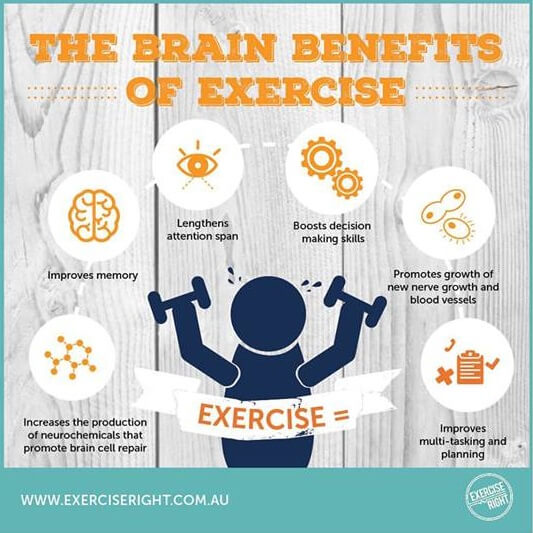There are many brain benefits of exercise. Exercise has been proven to improve cognitive health. Moderate aerobic exercise escalates your heart rate and increases blood flow.
Also, your breathing will increase which delivers more oxygen to your brain. This increases the production of neurons that help control thinking and memory. Your brain volume increases and this is believed to deter the effects of dementia.
Exercise also promotes the production of neurotrophins. This leads to better brain plasticity, which leads to better memory and learning.

Brain Benefits of Exercise
- Increases the Production of Neurochemicals that Promote Brain Cell Repair
Exercise is critical for your brain. Your brain can decrease in size without use, and can be damaged from stress and depression. Exercise produces neurochemicals. Neurochemicals reverse the damage and increase the size of your brain.
The neurons in your brain connect like branches. With exercise, you can increase branch growth and improve brain function.
- Improves Memory
Research has found that aerobic exercise increases the size of the hippocampus. The hippocampus is the area of the brain that plays an important role in verbal memory and learning. Other forms of exercise do not produce the same brain benefits of aerobic exercise.
Exercise also has been shown to improve sleep and mood. This, in turn, decreases stress and anxiety. Cognitive impairment is a known side effect of lack of sleep and bad moods.
- Lengthens Attention Span
Your brain can benefit from exercise. Research shows that students perform better on tests when they engage in moderate physical exercise before class. Those that exercised were more focused and able to ignore distractions.
- Boosts Decision Making Skills
A moderate-intensity workout in the morning can help you make better decisions throughout the day. Taking a 3 minute walk break every 30 minutes gives your brain a break and boosts your memory skills.
- Promotes Growth of New Nerve Growth and Blood Vessels
Exercise increases the blood flow to the brain. This leads to the growth of new blood vessels which deliver blood to the nerve cells. This is known as angiogenesis. When nerve cells receive more blood, there are new nerve cells created. This is known as neurogenesis.
- Improves Multitasking and Planning
People who participate in aerobic workouts have greater brain stimulation in the frontal lobe. The frontal lobe of the brain is the area responsible for executive function. Executive function includes such things as planning, organising and remembering details.
How to Choose the Best Exercise for Your Brain
- Choose an exercise that is good for your heart. If it is good for your heart, it is good for your brain.
- Aerobic exercise improves brain function and promotes cell repair.
- Morning exercising increases brain activity and boosts your memory and decision-making skills. The brain benefits of exercise will help you throughout the day.
- Choose exercises that increase your heart rate.
- If you feel mentally exhausted, do some quick exercises. This will get the blood flowing and increase your oxygen intake. Take a short walk or do some jumping jacks.
Call Us to Learn More
Exercise and brain health go hand in hand. Many people only think about their physical appearance and abilities when exercising. But physical exercise for the brain is also a major factor. To learn more about the brain benefits of exercise give Sydney Sports and Exercise Physiology a call today.
